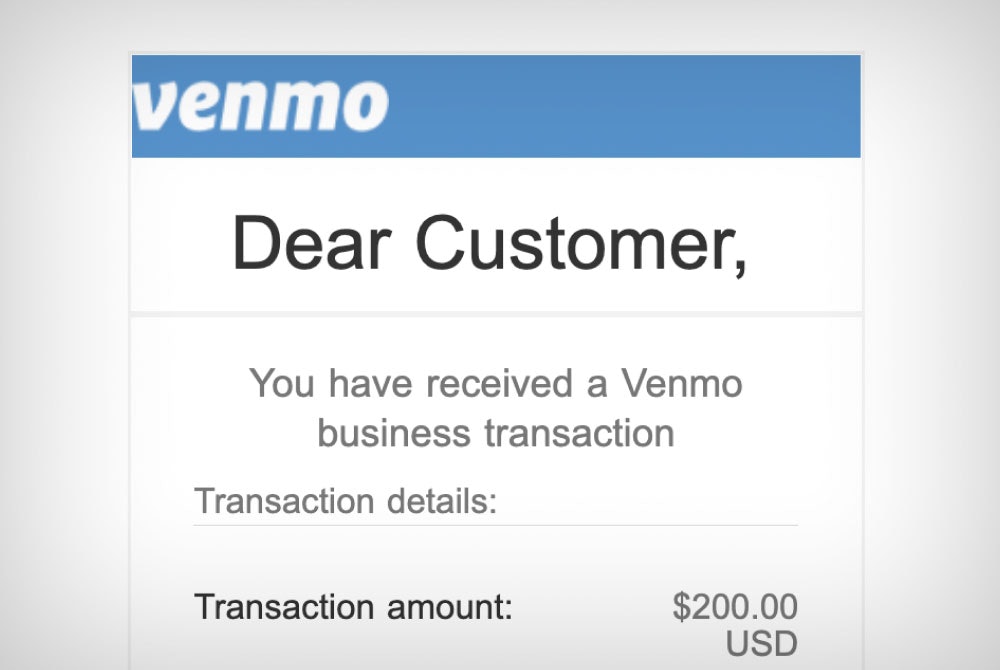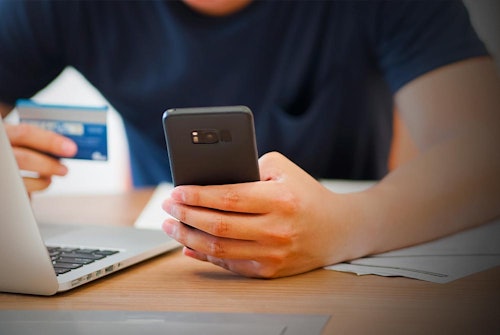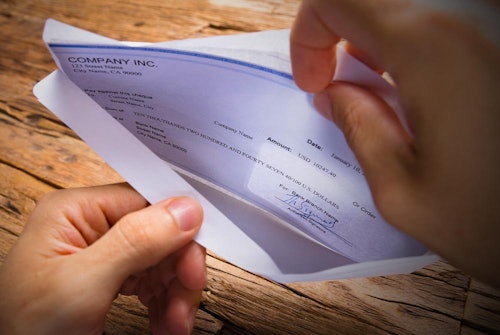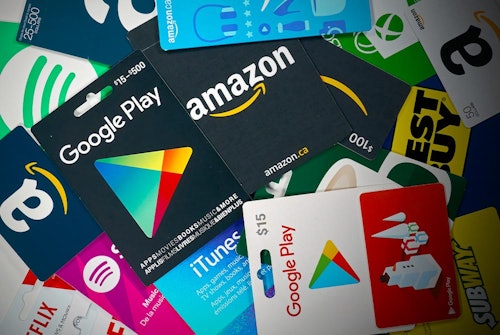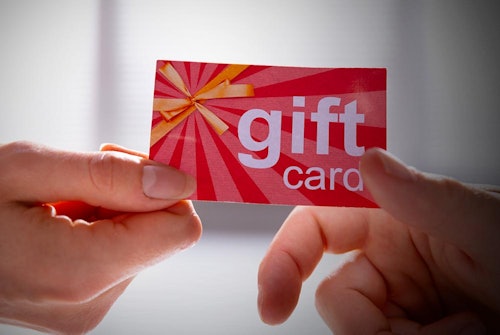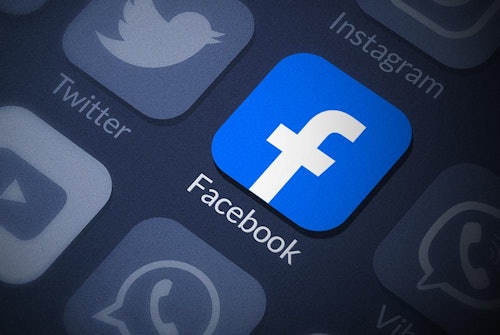Facebook In Depth
As the world’s leading social networking platform, Facebook attracts 2.89 billion monthly active users worldwide. In 2004, Mark Zuckerberg created the website in his Harvard dorm room to connect college students. Today, Facebook has grown to attract people of all ages and nationalities from all over the world. Through the years, Facebook has grown from a platform for sharing life updates and connecting with friends to a place where people gather information about companies, buy and sell used items, find jobs, and read the news. That popularity, unfortunately, makes it an ideal breeding ground for Facebook scams.
Common Facebook Scams
Users log on to Facebook for both personal and professional reasons, which means scams can vary widely in nature. Below are the most common Facebook scams.
Phishing Scams
In this phishing scam, you’ll receive an email that appears to originate directly from Facebook, urging you to log in to your account for any number of reasons. It may claim your account has been compromised, your password needs to be reset, or another circumstance that might encourage you to click the link and act quickly. If you click the link, it will take you to a fraudulent Facebook page to enter your account credentials, which the scammers will then use to gain access to your account.
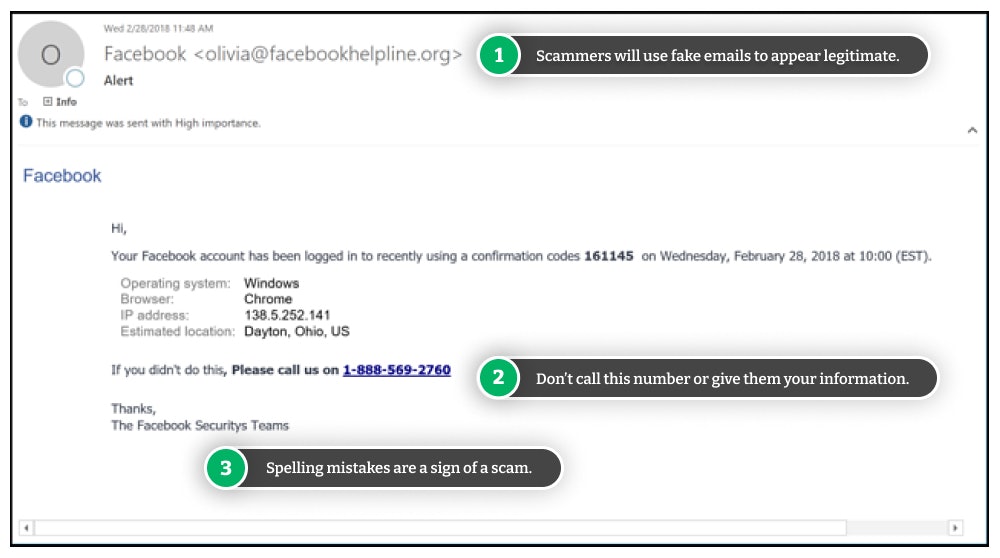
Clickbait and Fake Ads
Misleading, fake, and sensationalized stories are popular scam material on Facebook. If you see an advertisement for a shocking video or a link that appears to discuss new Facebook features—such as a “dislike” button or a way to track who’s viewed your profile—that link will typically lead you to a site that will install malware on your computer.
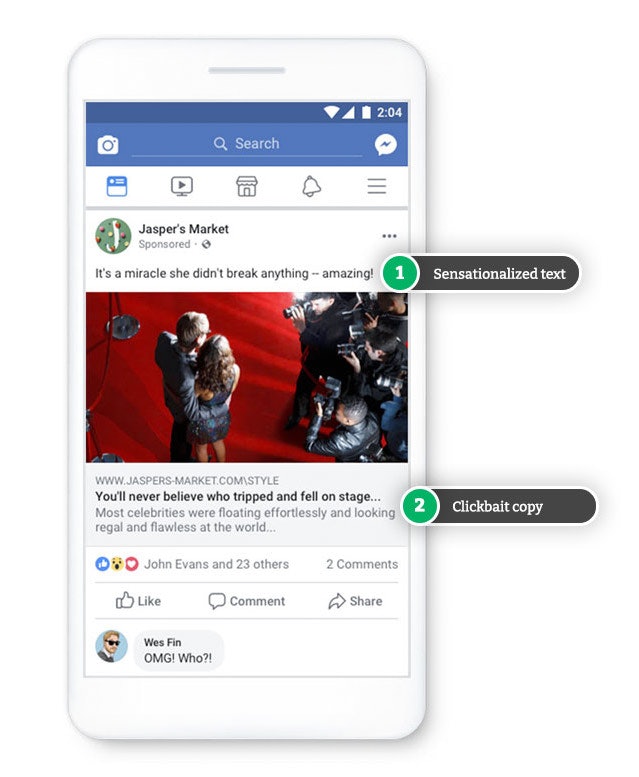
Fake ads for shopping sites also fall into this category. When you click on the ad, it will take you to a website that seems legitimate. You may decide to purchase an item, but it either never arrives or isn’t what you expected—and now the scammer has also captured your personal and financial details.
Giveaway, Lottery, and Sweepstakes Scams
Scammers create pages or accounts for giveaways, then try to drum up attention for the competition and ask users to comment, like, and share their posts so that more people sign up for the chance to win airline tickets, products, and other prizes.

When you enter the competition, you are usually directed to a website to enter your personal information and sign up for the contest. Unfortunately, the website may install malware on your devices, and you risk having your identity stolen.
Facebook Scams with Advance Fees
These scams can concern various topics, but generally, in each case, users will be asked to pay a small advance fee to qualify for the offer.
One possible version is the job scam. These involve job postings on Facebook that request an upfront payment before you can apply.
In a lottery scam, you’ll receive a Facebook message stating you’re one of the winners of a lottery, and you can receive your money in exchange for a minimal fee. You’ll need to provide your personal information and bank details to receive the funds, which of course, do not exist.
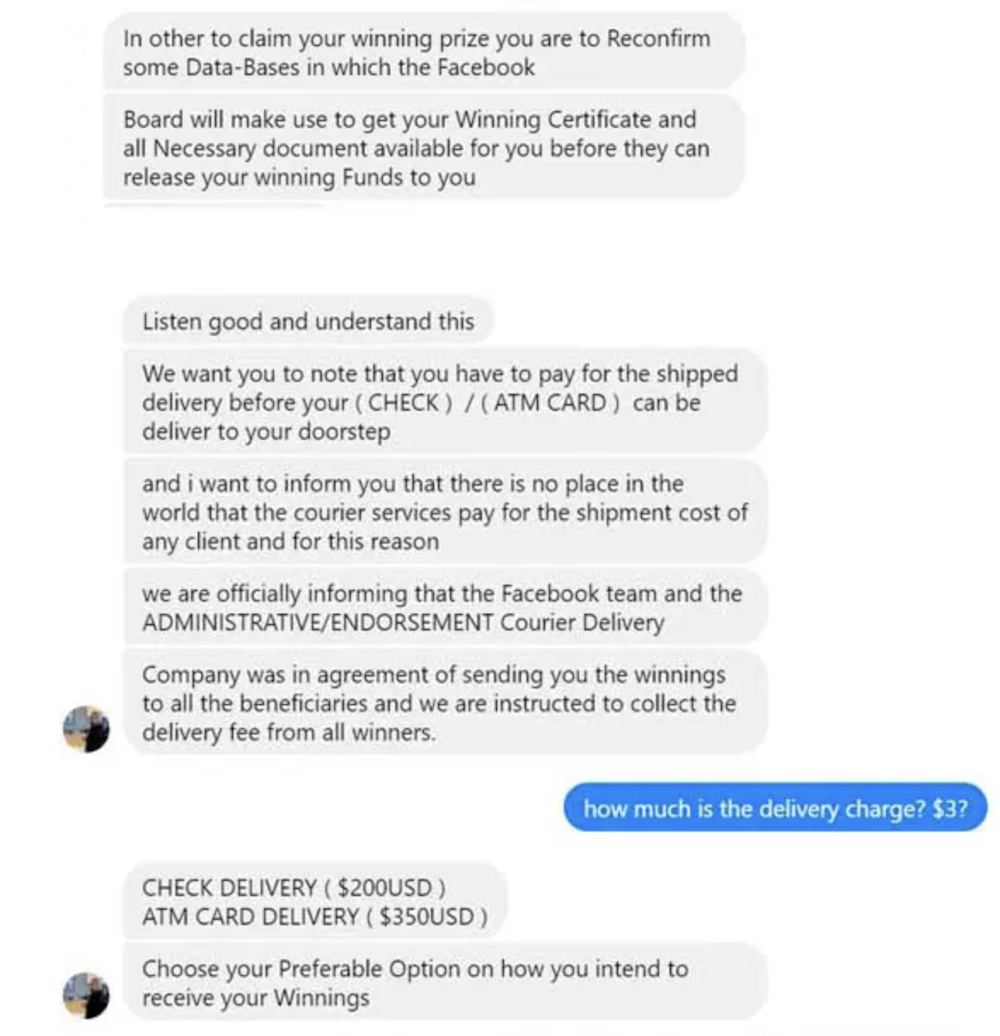
If you see a post advertising loans at low-interest rates in exchange for a small advance fee, it also falls into this scam category. The posts typically boast about their successful history of loaning to past customers and usually contain spelling and grammatical errors that are tell-tale signs of a Facebook scam.
Account Cloning
Sometimes scammers can recreate fake Facebook profiles of existing users. They then use the fake account to spam their friends with a story about a distressing situation and ask for money. Since you’re receiving the message from someone you believe you know, you might be more inclined to help them out. However, a scammer may have cloned the friend’s account, or the scammer might have gained access to the account through other methods.
Romance Scams
You might receive a Facebook message from someone you don’t know. The conversation starts friendly but soon develops into something more romantic and personal. The person might live overseas and have a sad backstory. Usually, they can’t video chat or meet with you in person because they’re claiming to be someone else.
Eventually, they will start asking you for money for various reasons, and they disappear with your hard-earned money.
Facebook Scams with Fake Charities
Because of Facebook’s reach, charities often use it to raise awareness about various important causes. Unfortunately, scammers also take advantage of Facebook’s broad platform to set up pages for fake charity causes. They frequently rely on shocking images and emotional stories to appeal for donations. Sometimes, the fake charity causes are related to recent tragedies and natural disasters.
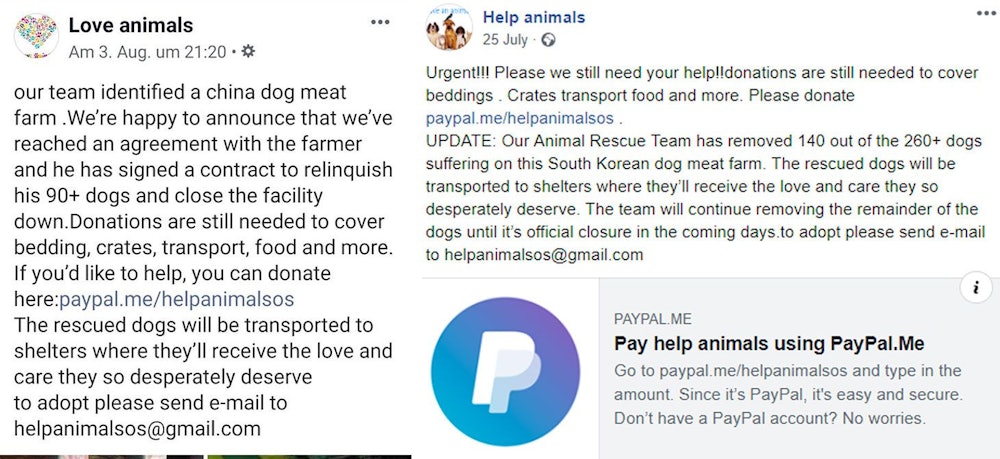
Facebook Marketplace Scams
Facebook users use Facebook Marketplace to unload their old possessions or scout for good deals on in-demand items. It’s easy to fall victim to Facebook Marketplace scams since you’re often dealing with strangers. When you meet to receive the item, you might find it’s nothing like the person described—it could be fake, broken, or even stolen.
A seller could also request that you pay online or via check, wiring service, cryptocurrency, or online payment service and then disappear as soon as you send the funds.
How to Beat Facebook Scams
Facebook scammers constantly update their schemes to take advantage of users with increasingly conniving methods. Follow these tips to beat the scammers and stay safe while using the world’s most popular social network:
- Don’t click on suspicious links or attachments directly on the Facebook site or in the Facebook Messenger app, even if a friend is sending them to you.
- Check the sender in any emails claiming to come from Facebook (sender’s email address should end in fb.com), and don’t respond to any emails asking for your passwords.
- Watch out for suspicious logins by checking your login history.
- Avoid clicking on invitations or accepting friend requests from people you don’t know.
- Research charities, companies, contests, and competitions outside of Facebook to confirm their legitimacy.
- Only pay for items bought on Facebook Marketplace after receiving the item, and meet up with the seller in a well-lit public location such as a police station.
- Keep conversations within Facebook, and ignore requests to take the conversation to another platform.
- Avoid messages and posts with poor spelling and grammatical errors.
- Check any links you’re viewing on Facebook Mobile Browser for a green lock next to the URL, indicating the link is secure and has been verified by Facebook.
Protection Against Facebook Scams
You can protect yourself from Facebook scams by contacting Facebook directly and using the free tools it offers to provide additional security and privacy when browsing.
It's important to verify links and contact details to beat imposters.
Report to Facebook
If you receive a message that you believe to be a scam, do not open it, if possible. Report it to Facebook at [email protected].
If you have concerns about a specific individual, you can also report that person or profile. To do that, click the three dots at the right of the person’s name and select “Find Support or Report Profile.” You’ll have to choose the option that describes how the person has violated Facebook’s Community Standards. Depending on your feedback, you may then be asked to submit a report to Facebook.
You can also report specific posts, Pages, Groups, ads, events, fundraisers, comments, and items on Marketplace.
Use Facebook Checkout
If you purchased an item using checkout on Facebook, your purchase might be covered by Facebook’s Purchase Protection. You can request a refund if:
- You didn’t receive an order
- The condition or description of the item was inaccurate
- The seller refused to refund you according to their stated refund policy
- The purchase was unauthorized
- The seller was removed from Facebook
Unfortunately, Facebook’s Purchase Protection does not cover purchases made through third-party sites, local pickups, Messenger transactions, or other messaging services. If you don’t receive an item you paid for using PayPal or a wiring service, you’d have to contact those services or your bank to request a refund.
Manage Your Security
Facebook offers Security Checkup, a free service that reviews and bolsters the security on your account when you log in. From there, you can opt to receive alerts when there’s a suspicious login noted on your account. You can also enable two-factor authentication.
It’s also a good idea to create a strong password that would be difficult for others to guess and isn’t used for other accounts. Facebook recommends using a phrase or series of words and mixing uppercase and lowercase letters.
To determine how much information other users can view on your profile, head to your profile page and click on the three dots on the bottom right corner of your profile photo. In the dropdown menu that appears, click “View as” to see which information is publicly viewable to strangers. Each time you make a post, you can choose who can see it—just you, your friends, or the custom groups you create. Avoid the “Public” option as much as possible.
Scams Impacting Facebook
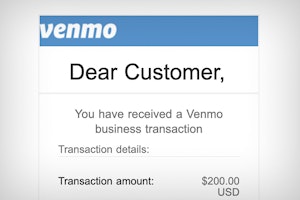
Selling on Facebook Marketplace? Beware of Fake Venmo Emails
Scammers are sending fake Venmo emails to Facebook Marketplace sellers in an attempt to steal login information and money.
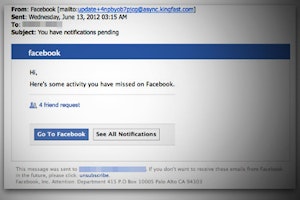
Is That Email Really From Facebook? 5 Foolproof Ways to Spot a Scam
If you ever need to check your Facebook account, always log in directly from the app or by typing in the URL. Don't trust every link you receive in your email.

Avoid Paying for a Pet via a Cash App Deposit—It's a Scam!
Keep your money safe by only paying for your new pet once you have the pet in your possession and avoid using Cash App.

Minimize Your Risk of Falling for Online Puppy Scams
Stay cautious when buying pets from private sellers online—many listings could be fake with scammers attempting to steal your money.
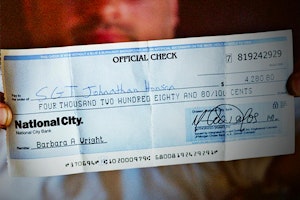
Know the Telltale Signs Of Fake Cashier's Check Scams
When selling items online, accepting a cashier's check for payment can be a risky business as scammers use fake cashier's checks to steal from you.
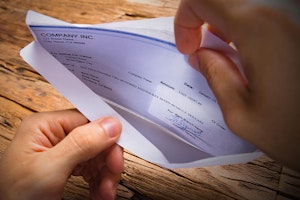
Beware of Fake Cashier's Checks on Facebook Marketplace
Facebook Marketplace may seem like the best place to find a deal, but it comes with the risk of being scammed by fraudsters with fake checks.

How to Avoid Fake Tickets to Events, Flights, and More
Buying tickets via sites like Craigslist and Facebook may be the cheaper option, but you also risk buying a fake ticket that won't get you anywhere.
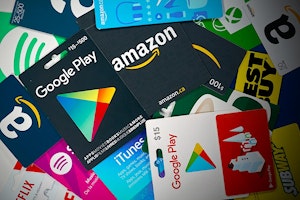
How Do You Beat Gift Card Scams? Never Pay Using Gift Cards
Beating this scam is simple—don't pay for anything using gift cards and don't give anyone you don't know or trust your gift card information.
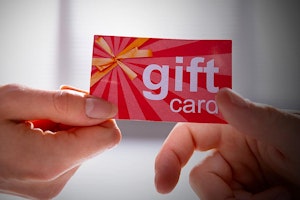
How to Avoid Facebook Free Gift Card Scams: Red Flags
Not all ads and posts you see on Facebook are trustworthy—in fact, most free gift card offers are actually scams.
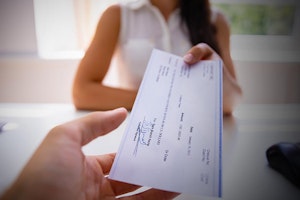
Beware of Fake Cashier's Checks in Craigslist Transactions
Beware of buyers on Craigslist who only want to pay for your item with a cashier's check, then overpay you for your items—they're trying to steal money from you.
Guides To Protect Against Online & Digital Scams

How to Spot a Fake Louis Vuitton Belt Before You Buy
You're finally ready to pull the trigger on that Louis Vuitton belt you've been eyeing, but before shelling out the big bucks, use these tips to make sure you're not getting ripped off.

5 Holiday Scams Waiting to Steal Your Joy This Season
Whether you donate to a charity this season or buy your family a new puppy, scammers are eagerly waiting to trick you into giving up your personal information in these holiday scams.
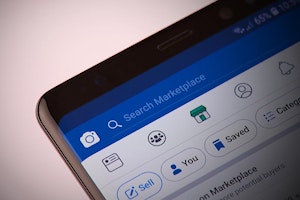
Facebook Marketplace Scams: How They Work & Red Flags
Online marketplaces may offer you opportunities to find some great deals—but they offer scammers just as much of a chance to score.

Spot & Avoid These 11 Common Facebook Messenger Scams
With every Facebook Messenger scam, the attacker is trying to steal from you—whether they’re after money, login credentials, or other personal information.

How to Beat Facebook Scams and Keep Your Money and Info Safe
With more than 2.7 billion Facebook users worldwide, the social media platform has become a playground for scammers who target unsuspecting users.
News About Online & Digital Scams

Urgent CDC Warning: Eye Drops Linked to 3 Deaths, Loss of Vision
The CDC is warning eye drops users of a rare bacterial infection from 2 brands of eye drops. The infection is resistant to antibiotics and has resulted in the loss of vision, loss of eyeballs and the death of 3 patients.

Banks May Refund More Zelle Scam Victims in 2023
Zelle scams have reached a serious volume. New reports suggest that banks are looking at new refund protections for customers in 2023.

Optus Data Breach - One of the Worst Cyberattacks in Australia
Hackers have gained access to 9.8 million customer records from Optus in Australia, exposing personal information such as driver licence, medicare and passport details.

Roe vs. Wade Overturned: Abortion Rights in Your State
Find out what the overturning of Roe vs. Wade means for abortion rights in your state.
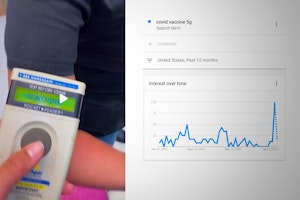
Searches for "COVID Vaccine 5G" Hit All-Time High, But Microchips Definitely Not in Vaccine
The number of people searching for the term "COVID vaccine 5G" on Google has just hit an all-time high, but there's one way to be sure that there are no microchips.
